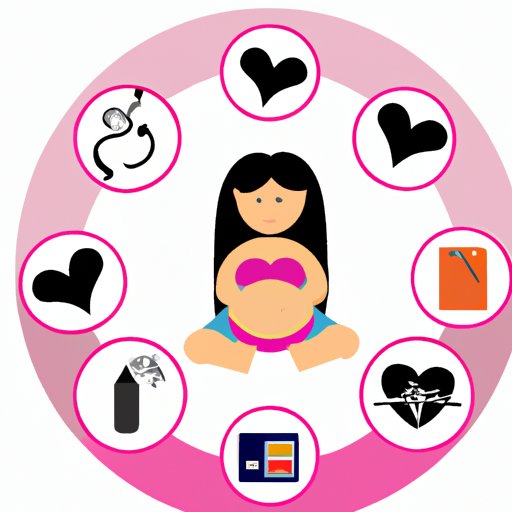
I. Introduction
Pregnancy is a topic that carries a lot of myths and misunderstandings, especially when it comes to periods. Do you know that it’s possible to be pregnant and still have your period? In this article, we will explore this intriguing phenomenon and share with you some crucial information about the relationship between menstrual cycles and pregnancy.
II. The Surprising Truth: Yes, You Can Still Get Your Period While Being Pregnant
One of the most perplexing aspects of pregnancy is the possibility of experiencing vaginal bleeding that resembles menstrual periods. While it may seem counterintuitive, bleeding during pregnancy is a real occurrence that could happen to some women.
The causes of menstrual-like bleeding during pregnancy could be many, including implantation bleeding, hormonal shifts, or cervical irritation. However, regardless of the causes, any vaginal bleeding during pregnancy should not be ignored or dismissed as harmless. It could indicate serious conditions such as ectopic pregnancy or miscarriage, which require immediate medical attention.
III. Period or Pregnancy? Understanding the Differences and Similarities
To understand why it’s possible to have a period while being pregnant, let’s first break down the characteristics of menstrual bleeding and how it relates to pregnancy. While both menstrual and pregnancy bleeding happen in the female reproductive system, they differ in many ways.
For example, menstrual bleeding follows a regular pattern, usually happening every 28 days and lasting for 3 to 5 days, whereas pregnancy bleeding could occur irregularly, with varying volumes and colors. During pregnancy, the uterus and cervix undergo numerous changes and become more sensitive and prone to bleeding. Additionally, some women may experience symptoms such as nausea, fatigue, or breast tenderness, which could be signs of pregnancy or PMS.
Therefore, it’s essential to know your own body and its patterns to recognize any unusual bleeding or symptoms that could signal pregnancy or menstrual issues.
IV. 5 Signs You Might Be Pregnant Even If You’re Still Getting Your Period
If you suspect that you might be pregnant but are still getting your period, pay attention to some early signs that indicate a possible pregnancy. These could include nausea and vomiting, tender or swollen breasts, frequent urination, fatigue, and mood swings.
However, keep in mind that these symptoms could also overlap with menstrual or PMS symptoms, making it challenging to know for sure. The most reliable way to confirm a pregnancy is to take a pregnancy test or consult with a healthcare provider. The sooner you seek medical attention, the better chances you have for a healthy pregnancy and labor.
V. Could Your Menstrual Cycle Fool You into Thinking You’re Not Pregnant?
Even if you take a pregnancy test, some factors could compromise its accuracy and give you false negatives or positives. These factors could include taking the test too early, using certain medications, or having medical conditions such as polycystic ovary syndrome (PCOS).
Therefore, it’s essential to be aware of your menstrual cycle and its patterns to have a better sense of when to take a pregnancy test and what results to expect. If you suspect that your period is not following its usual pattern, try taking another test or consult with your healthcare provider.
VI. A Guide to Deciphering the Difference between Implantation Bleeding and a Period
One of the most common causes of vaginal bleeding during pregnancy is implantation bleeding. This type of bleeding occurs when the fertilized egg attaches itself to the uterine lining and causes some minor spotting.
However, distinguishing between implantation bleeding and menstrual bleeding could be tricky. Implantation bleeding tends to happen earlier than a period, usually around ten days after ovulation. It’s also lighter in volume and has a pink or brown color compared to period blood. Additionally, it could be accompanied by mild cramping or a light vaginal discharge.
VII. Why Tracking Your Menstrual Cycle Is Crucial for Detecting Pregnancy Complications
Finally, tracking your menstrual cycle could play a significant role in detecting potential pregnancy complications and seeking timely medical care. Some pregnancy conditions, such as ectopic pregnancy or preterm labor, could cause vaginal bleeding or other symptoms that could indicate a problem.
Therefore, if you notice any abnormal changes in your menstrual cycle or experience any pregnancy-related symptoms, such as abdominal pain or fever, seek medical attention as soon as possible. Early detection and treatment of pregnancy complications could improve your chances of a successful pregnancy and delivery.
VIII. Conclusion
In conclusion, getting your period while being pregnant is possible and could happen for various reasons. However, it’s crucial to remember that any vaginal bleeding during pregnancy should be taken seriously and evaluated by a healthcare provider. Whether you’re trying to conceive, already pregnant, or simply curious about your menstrual cycle, always listen to your body, know your patterns, and seek medical advice when in doubt.
If you need further information or support, don’t hesitate to consult with a healthcare provider or visit online resources such as the American Pregnancy Association or the Mayo Clinic. By educating yourself about your body’s workings and being proactive about your health, you could ensure a more comfortable and fulfilling pregnancy experience.




